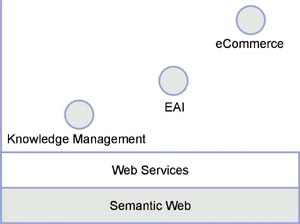| 2004 |

|
YEAR BOOK |
National University of Ireland, Galway
|
Digital Enterprise Research Institute (DERI)
|
In June 2003, NUI Galway was awarded �12 million over five years from Science Foundation Ireland (SFI) to fund the new Digital Enterprise Research Institute (DERI). The Institute, which is being co-funded by Hewlett Packard's European Software Centre, will be at the forefront of research into the next generation of web technology � the Semantic Web. The new Institute is directed by Professor Dieter Fensel, a leading world figure in Semantic Web research, and Professor Christoph Bussler, a leading figure in Semantic Web Services (SWS) research, who plan to build the number of research staff in DERI to over 60 post graduate and post doctoral researchers by 2008.
Conceived by the architects of the Worldwide Web, the Semantic Web provides a way of managing the explosion of information on the Web. Still in its infancy, the Semantic Web, when fully developed, will revolutionise how people utilise the Web.
Research at DERI is organised around clusters, representing the Institute's areas of expertise. The figure depicts the different clusters and their relationship to each other. Semantic web and web services build the foundation for the three application areas � knowledge management, EAI and eCommerce.

Semantic Web
The Semantic Web cluster is developing and researching the infrastructure for new types of applications in eGovernment, eCommerce and eSociety (e.g., Online Social Networking). Infrastructure components currently under development are: scalable metadata storage and retrieval techniques, reasoning engines able to handle heterogeneous data, ontology development, -deployment and -evolution, and content annotation of metadata.
Other areas of interest are distributed computing � especially in the area of P2P and Grid computing. Initiation of, and collaboration with, standardisation efforts through foundation technology groups such as the W3C working group, and applications groups in both the scientific and industry domains will ensure that DERI acts as the crystallisation and integration point for Semantic Web infrastructure world-wide. Open-source prototypes enable the rapid adoption of technology and lead to leading status of DERI technology in the Semantic Web area. This cluster is lead by Dr Stefan Decker ( [email protected] ).
Semantic Web Services
The Semantic Web Services cluster, as its main goal, is develop-ing a scaleable Semantic Web Service modelling and execution solution with a combination of Web Service and Semantic Web technology. Web Services and Semantic Web technologies address different problem spaces. Our approach is to consider these two technologies complementary, and to combine them to develop a more powerful technology, namely Semantic Web Services.
Under the lead of Professor Christoph Bussler ( [email protected] ), this cluster aims to implement a complete software stack comprising of a conceptual model of Semantic Web Services, a language to define Semantic Web Services, as well as a modelling and execution environment for the definition and execution of these services. As part of the research work, the following topics will be investigated: Web Service Modelling Framework and Language, Semantic Web Service Mediation, Semantic Web Service Detection and Introspection, Semantic Web Service Invocation, and Semantic Web Service Execution.
Knowledge Management
Organisational efficiency depends on the effective management of innovation. Innovation leads to new products and services that delight customers, high quality processes that keep costs competitive, and agile organisations capable of meeting unforeseen challenges.
Knowledge management is a principal approach to improving innovation. In many organisations, it is innovation that brings knowledge management to life and puts it to work for the benefit of the organisation. Organisations spend an average of 4% of turnover on innovation, aimed at increasing efficiency, expanding the product portfolio, and developing new services. Research shows that up to 90% of this innovation fails.
The aim of the Knowledge Management cluster is to provide semantic web portals and collaboration environments that will facilitate highly efficient management of innovation. The technological mission is to create ontology needed for semantic innovation community portals and to make extensive usage of semantic web technologies for enhanced information sharing among innovation communities of practice across the extended enterprise. This cluster is lead by Dr David O'Sullivan ( [email protected] ).
Enterprise Application Integration and E-Commerce
E-Commerce is giving choices unimaginable a few years ago. But it can be a problem trying to understand how two offers differ. Does economy and large mean the same thing for two different brands of soap powder? Understanding these semantic differences today is mainly a human endeavour. Semantic annotation of documents will provide the ability to perform semantic querying and ontology based browsing. People and computers will find what they need more easily using this powerful new approach. They also will find information that they would have missed using conventional searching.
EAI is one of the largest areas of Information Technology spend in the world today. It is difficult because of the semantic differences that occur between different businesses, systems and processes. A large proportion of the cost of integration is attributable to the analysis of those differences and understanding how to bridge them. Mediation based on ontologies for businesses, processes and systems has great potential for enabling the automation of integration.
Semantic Web technologies have the potential to be disruptive in both eCommerce and EAI. Our research is trying to discover how this disruption can take place. Pat Croke leads this cluster ( [email protected] ).
|
|
Contact: E-mail: [email protected] ; Web: www.deri.ie